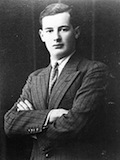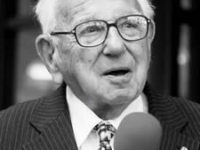Swedish businessman Raoul Wallenberg (1912 – ?), with financial backing from the U.S. War Refugee Board, rescued many thousands of Jews in German-occupied Budapest in 1944-1945.
Wallenberg was recruited to go to Hungary by War Refugee Board emissary Iver C. Olsen, who also persuaded the Swedish Foreign Ministry to grant Wallenberg diplomatic credentials in order to facilitate his rescue work. Using funds provided by the Board (from contributions by the American Jewish Joint Distribution Committee), Wallenberg rented thirty-one buildings in Budapest and declared them to be part of the Swedish embassy. He sheltered an estimated 10,000 Jews there. Wallenberg provided Swedish identity documents, or “protective passports,” to Jews to shield them from deportation. In more than one instance, he climbed to the roof of a train car preparing to deport Jews to Auschwitz and handed out dozens of the passports to the Jews inside, and then took them to waiting cars that brought them to his safe houses.
Wallenberg was arrested by Soviet forces during the battle for Budapest, on suspicion of working for U.S. intelligence. He was never heard from again. The Soviet authorities offered conflicting explanations as to his whereabouts. In 1981, Congress awarded Wallenberg honorary American citizenship, and a postage stamp with his likeness was issued in 1997.
Sources: Wyman, The Abandonment of the Jews, pp.240-243; Medoff, FDR and the Holocaust, p.105.











